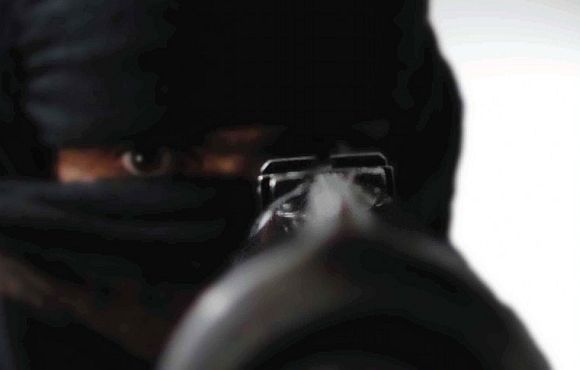
'One thing is certain: Demonetisation has broken the back of terror funding,' says Colonel Anil A Athale (retd).
Within days of Prime Minister Narendra Modi's demonetisation announcement, two terrorists killed at Bandipora in Kashmir were found with brand new Rs 2,000 notes! The incident clearly showed the umbilical link between terrorism and money.
In April 1997, after six years of research and over 12 visits to Kashmir, I wrote a book Let the Jhelum Smile Again! General K V Krishna Rao (retd), the then Jammu and Kashmir governor, very graciously traveled to Pune to release the book. One of my conclusions in the book was about terrorist finance -- that the Indian taxpayer was the biggest source of funding for the terrorists!
In Kashmir, it was routine to pad all contracts with at least 10 per cent extra cost. This was paid to the terrorists as protection money. Government servants, school teachers and traders all paid this protection money.
In the 1990s it was common knowledge that forest department trucks were used to ferry ammunition for the terrorists. Without this oxygen, terrorism could not live.
General Rao agreed with my observation and asked me to give him an autographed copy for then chief minister Farooq Abdullah.
19 years have passed, but the ground reality has not changed much. That is till November 8 when the Modi government in one fell swoop abolished Rs 500 and Rs 1,000 notes.
Terrorists and separatists have to perforce keep a large part of their loot in cash. They need money to pay their cadres to hurl stones, attend rallies, hire transport for the 'cause' and finally to bribe corrupt officials to turn a blind eye to their activities.
What are the sources that fund their lavish lifestyles and their children's education in fancy institutes abroad?
The effect of the cash crunch faced by the separatists in Kashmir is for everyone to see.
For the first time in four months, we have witnessed Fridays without the routine 'stone throwing' ritual in the Kashmir valley.
The Kashmiri separatists are not the only ones to face the heat of demonetisation. The Naxalites are equally hard hit. The Naxals have been running a thriving protection racket in the tribal dominated states for years. Has there been ever an attack on privately owned mines or foreign companies?
The answer to this is negative as all of them pay protection money to the Naxals. Since this money has to be used to pay 'salaries' to cadres and sympathisers, it has to be perforce in cash.
According to a rough estimate, the Naxals have suffered a loss of close to Rs 7,000 crore (Rs 70 billion) due to demonetisation.
Anyone remotely familiar with the situation in the north-east knows that every single truck passing through insurgent-hit areas pays 'tax.' The insurgents even issue receipts.
The parallel government in some of the north-eastern states is so institutionalised that the 'tax' is deducted directly from the salaries of all government servants. Even governors and ministers are known to pay this 'tax.'
What applies to the terrorist groups and insurgents is also true of organised crime.
The criminals who operate protection rackets, smuggle drugs and arms also need liquid cash. It is also well worth remembering the close linkage between corruption and terrorism.
After all, it was a corrupt custom official who facilitated the landing and transport of RDX explosive used in the March 12, 1993 blasts in which over 300 people lost their lives.
The Achilles heel of all the violent groups is the shortage of ammunition.
Mere possession of arms is of little use unless the 'consumable' that is ammunition is available. Ammunition costs money in the arms black market.
Since the Rs 500/1,000 currencies were convenient to carry and distribute, most of the cash reserves of terror groups, insurgents, Naxalites and organised crime gangs were held in these denominations.
When the government made these notes defunct overnight, all these groups took a financial hit. It will take them a while to recoup their losses.
Finally, the issue of fake Indian currency.
It is well known that our neighbour has been pumping huge quantities of fake currency to pay for anti-national activities. These currencies were being pumped into India from Nepal, Bangladesh, Sri Lanka, Thailand and some other countries.
As the Indian economy moves more towards cashless transactions the problem of detecting fake currency will become easier.
Anyone who has traveled abroad will have experienced that when one presents say a $100 note, it is scrutinised very carefully since most transactions are in plastic money.
Once the volume of cash in the Indian economy is reduced, similar checks will be possible. Presently, the sheer volume of cash in the market defeats this measure.
It is true that a large portion of black money or gains from illegal activities like corruption and other crimes is invested in gold or real estate. The Benami Properties Act that came into force on November 11 will take care of this as well.
Irrespective of other economic factors, one thing is certain: Demonetisation has broken the back of terror funding in the immediate future.
It has thus saved many lives by preventing terror attacks. The desperation of the insurgent groups is already evident by the attempts at bank robberies.
Demonetisation has given a shot in the arm for the fight against terror funding.
Colonel Anil A Athale (retd) is a military historian specialising in insurgency studies.










